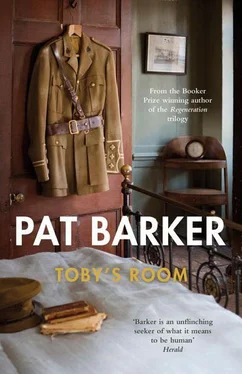‘Is that a dig at me?’
‘My dear chap. Wouldn’t dream of it. You’re a temporary gentleman, I’m a temporary non-gentleman. That’s just the way it goes.’
Paul could feel Elinor itching to ask about Toby’s death, but she waited until there was a natural pause in the conversation and then handled it really rather well. No reproach for Neville’s not having written, no suspicion, just a dignified expression of her desire for more information.
‘I think it would help my parents to know a bit more,’ she said. ‘I know it would help me.’
Neville’s expression was unreadable, but then all his expressions were unreadable.
‘Nothing to tell, I’m afraid. Direct hit. His death was instantaneous, completely painless. He was a brave man, a wonderful doctor, everybody who came into contact with him admired and respected him.’ He might have been reading from a script. ‘I don’t know what else to say.’
‘Did you see him die?’
A fractional hesitation? ‘No.’
Elinor quite clearly didn’t believe him — and, rather to his surprise, neither did Paul. He couldn’t think of anything further to say. After a few minutes of strained silence, Elinor stood up. ‘Do you know, I think I might have a walk round the garden.’
‘Are you all right?’ Paul said.
‘Fine, I just need a bit of fresh air. Anyway. I’m sure you two have lots to catch up on.’ She shook hands again with Neville, not looking at him, and turned to Paul. ‘I’ll be outside when you’re ready.’
After she’d gone, Paul said, ‘Sorry about this, we shouldn’t have come.’
‘So why did you?’
‘Because I couldn’t stop her coming, and I thought it would be worse if I wasn’t here.’
Neville shrugged. ‘Well, it’s done now. I suppose I have Tonks to thank?’
‘Not really, no, he told me you were here, but he made it perfectly clear you didn’t want visitors. It’s my fault, I should’ve stood up to her.’
‘You were never good at that.’
Paul was still inclined to hope that Neville might speak more freely — and more honestly — now Elinor was gone. If there was anything more to say about Toby’s death, Neville would tell a man rather than a woman, a serving soldier rather than a civilian — a relative least of all. But instead, he began to talk about old times, before the war, before the trauma. He talked about the years immediately after he left the Slade, his discovery of Futurism, the excitement of scraping away the dead layers of the past. And he talked about girls, the models at the Slade whom he’d painted because he had to, and slept with because he wanted to. He had an old man’s hunger for the past. Paul joined in easily enough, though he knew he’d have to raise the subject of Toby’s death again before he left. He owed Elinor that, at least.
At last, Neville’s stream of reminiscences seemed to be trickling to an end. Paul sat gazing into the fire, waiting for the right moment. He was tired; he hadn’t slept very well last night. Once or twice he caught Neville looking sideways at him; he was expecting the question. All right …
‘Is there anything else to say about Brooke?’
‘Nothing it would do her the slightest good to know.’
‘You could tell me.’
‘No, I couldn’t, you’ll tell her. Oh, I know you’ll say you won’t, but you would, you couldn’t help yourself. She’d have it out of you in no time.’
‘So there is something?’
‘You know the rules as well as I do. What happens out there stays out there.’ He stood up. ‘Along with my fucking nose.’
Clearly, the conversation was over. Paul had no choice but to get to his feet and accompany Neville to the door.
With his hand on the knob, Neville turned. ‘Will you come again?’
‘If you want me to.’
‘It’s up to you. No, I’d like to see you.’
He actually managed to make the admission sound hostile. The old Neville was still there, very much intact behind the shattered face, biting every hand that presumed to feed him.
‘I’ll come next week,’ Paul said. ‘Meanwhile, if there’s anything you want, just let me know.’
Neville nodded, tapped him briskly on the shoulder, and was gone.
When the door clicked shut behind Elinor, she stood for a moment listening, but no sound reached her from the room beyond. The door was solid oak. This house had belonged — perhaps still belonged — to a wealthy man. It would have been commandeered ‘for the duration’ — or perhaps he’d volunteered to move out. Either way, he was going to get it back in very poor condition. Scratch marks, made by hundreds of heavy boots, had ruined the parquet floors.
Elinor’s thoughts were skittering about like bugs on the surface of a pond while her real feelings lurked in the depths somewhere, out of reach. She looked around: she’d lost all sense of where the main entrance was.
A man with one eye came up to her. ‘Can I help you?’
The other eye was a moist slit with a few sparse eyelashes clinging feebly to the lid.
‘No, thanks, I’m fine.’
She pretended she had somewhere to get to and walked off, head down, away from him. She could feel him watching her with his one eye, and started to walk faster. A turning led into a dark passage; she was afraid she might have blundered into the kitchen area, but no, the passage opened out again on to a wider corridor. She knew she had to give Paul plenty of time to make Kit talk, so she would just go wherever this corridor took her. God, she’d have liked to shake the truth out of Kit, but it wouldn’t have worked. If she’d tried to put pressure on him he’d only have clammed up more. He wasn’t going to tell her anything.
She was walking head down when a near-collision with somebody in a blue uniform forced her to look up. The corridor, almost empty when she set off, had become crowded with people all moving in the same direction: some nurses, but mainly patients. Faces loomed up in front of her, all kinds of faces; the bodies in their garish uniforms hardly registered. Men with no eyes were being led along by men with no mouths; there was even one man with no jaw, his whole face shelving steeply away into his neck. Men, like Kit, with no noses and horribly twisted faces. And others — the ones she couldn’t understand at all — with pink tubes sprouting out of their wounds and terrible cringing eyes looking out over the top of it all. Brueghel; and worse than Brueghel, because they were real.
She had to get away. She scaled along the wall, quickening her pace as the crowd began to thin. By the time the last of them had gone by she was almost running, and not looking where she was going until her nose came into violent contact with a man’s chest. Slowly, she raised her eyes, braced for God knows what horrors, and found herself looking at Henry Tonks.
‘Miss Brooke. Good heavens.’
Her mouth opened but no sound came out.
‘You don’t look at all well. Come along, let’s see if we can find you a cup of tea.’
Still unable to speak, she fell into step beside him.
‘You must be visiting Mr Neville,’ Tonks said, pleasantly, as he unlocked a door.
‘Yes, that’s right. Paul Tarrant’s still with him. I fancied a breath of fresh air.’
Even that little lie made her feel uncomfortable. This was a place for truth.
Tonks ushered her into a large room that contained a desk, two chairs and a filing cabinet. There was a screened-off recess to her right. The part of the room she could see resembled a doctor’s surgery, except that at the far end, underneath the tall windows, there was an easel and a table covered with drawing pads, pens and ink and pastels. Directly underneath the window was a stool, presumably for the patient since it had been placed where the full, shadowless glare of northern light would fall directly on the face.
Читать дальше












